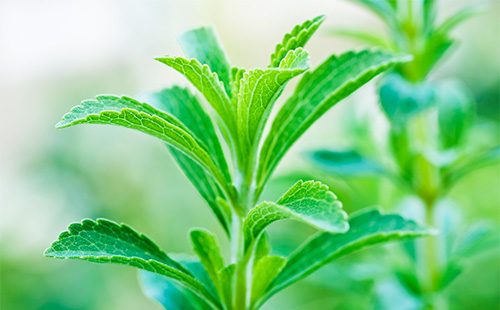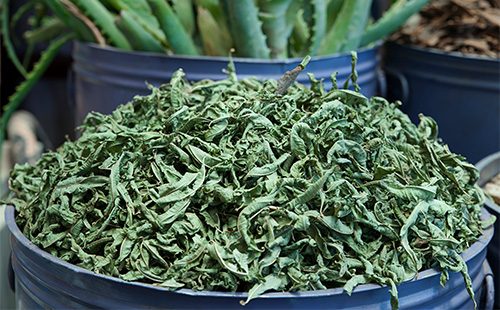The content of the article
The complex healing properties of plants have been studied by many scientific groups. In 1990, Chinese scientists presented research data to the public confirming the promotion of culture in the treatment of diabetes. Information has also been published on the antioxidant effect of the herb and its ability to rejuvenate the body.
Botanical characteristics of stevia
It grows in tropical and subtropical climates. Homeland are Brazil and Paraguay. Impressive plantations are concentrated in the eastern countries - Japan, China, Indonesia. The plant is cultivated in Ukraine, Israel, America. Recently, they began to grow at home in pots. If planted in open ground, then over the summer will grow, allowing you to prepare a sufficient amount of medicinal raw materials. In Russia, wild grass can be found only in the south of the European part.
The species used as a sweetener and for medicinal purposes is honey stevia. Others contain too few sweet substances. Breeders are constantly working on breeding new, sweeter and richer antioxidants. The morphological characteristics of the plant are as follows.
- Underground part. The root system is fibrous, penetrates into the soil up to 40 cm. The roots are long, dense, cord-like.
- The stalks. Under favorable conditions, stevia grows as a shrub - several main stems actively branch, forming a sprawling trapezoidal bush up to 120 cm in height. In adverse cases, a single dense cylindrical stem is formed up to 30 cm long.
- Leaves. They are located on the stem cross, opposite. The leaf plate is dense, leathery, deep green. The margin is slightly banded, the form is obovate. Fastened with shortened petioles.
- Flowers. Like all representatives of the Astrov family (Compositae), it blooms in small baskets formed of five to seven white flowers.
- Fruit. After flowering, fruits are formed on the bush - small boxes with multiple spindle-shaped seeds up to 2 mm long.
Harvesting raw materials
Leaves of honey grass are used as medicinal raw materials. Their harvesting proceeds to the budding phase.
- Collection. For the harvesting of leaves, all shoots are cut, departing from the soil 10 cm. Use a knife, scissors or secateurs.
- Training. Cut stems relieve lower leaves - they are not subject to harvesting. A few pieces are tied into loose panicles.
- Drying. To preserve the benefits and sweetness of the plant, it should be dried quickly and at low humidity. In wet weather, for three days of drying in natural conditions, a third of the nutrients in the chemical composition of the grass are lost.You need to dry panicles in the street in the shade, in limbo, ideally - in hot sunny weather and with through ventilation. The use of dryers is also acceptable.
Composition
Stevia honey is a leader in the content of safe sugars and antioxidants. The plant has a comprehensive beneficial effect on the body due to the large number of nutrients in the composition.
- Stevioglycosides. Substances with glycoside residues have a sweetness that is 100-300 times higher than sugar. In addition, they positively affect the state of blood vessels, eliminate their spasms, regulate blood pressure and normalize the myocardium.
- Polyunsaturated acids Omega-6. Polyunsaturated fatty acids regulate lipid metabolism, necessary for the production of hormones and immune cells, as well as for the construction and regeneration of cell membranes.
- Flavonoids. Natural antioxidant substances with a complex vasoprotective effect - regulate the tone of the vascular walls, their permeability, prevent sclerotic processes and proliferation of connective tissue.
- Nutrients. Stevia is rich in ascorbic acid, carotenoids, B vitamins, as well as minerals useful for humans. Nutrients are involved in metabolic processes, the construction of tissues and organs, the production of enzymes, hormones.
- Organic acids. Due to the content of arachidonic acid, it normalizes the functioning of the nervous system and starts the restoration of damaged unequal fibers. Chlorogenic acid inhibits the breakdown and absorption of glucose in the intestine, due to which it has a pronounced hypoglycemic effect.
- Pectins. They absorb toxins, contribute to the colonization of normal microflora in the intestine, envelop the mucous membranes, preventing their mechanical and chemical irritation.
- Volatiles. Honey grass contains a small amount of essential oil, the components of which exhibit bactericidal, fungicidal, antiviral and antiparasitic activity.
- Cellulose. Dietary fiber cleanses the body, normalizes intestinal motility, provided that sufficient water is consumed.
Due to its rich composition, the culture exhibits many pharmacological actions:
- immunostimulating;
- hypotensive;
- vasoprotective;
- restorative;
- immunostimulating;
- antitoxic;
- antibacterial;
- anti-inflammatory;
- antitumor.
Despite the many useful properties, take a phytochemical for the treatment of chronic diseases should only be recommended by a doctor.

Healing properties
The specific taste allows the plant to be used as a sweetener, however, stevia preparations can also comprehensively improve the body with regular use. The positive effects of honey grass are as follows.
- The cardiovascular system. Small doses of herbal remedies have a hypotensive effect, large doses increase pressure. Moreover, the effect is mild, without uncomfortable fluctuations in blood pressure. Grass stimulates the myocardium, making it more resilient, increases the amplitude of heart contractions, regulating the rhythm. The plant normalizes the viscosity and biochemical composition of the blood, facilitating its passage through the veins and arteries. By lowering cholesterol, it prevents atherosclerosis. Strengthening the vascular walls creates the prevention of heart attack, stroke, and helps in the treatment of varicose veins.
- Endocrine system. Honey grass improves the pancreas, helps to saturate pancreatic juice with enzymes, and improves insulin production. The hypoglycemic effect reduces the dose of the hormone in diabetics.In diabetes of the second type, cases of complete cure under the influence of stevia are known. Also fit means positively affects the state of the thyroid gland, improves the production of sex hormones.
- Immunity. Grass has general strengthening and immunostimulating properties. Antimicrobial activity allows you to accelerate recovery from infectious ailments. In folk medicine, with its help, they reduce the symptoms of urticaria, psoriasis, systemic lupus erythematosus. The antioxidant effect allows you to eliminate atypical cells in time by activating the body's immune forces. It also accelerates the healing of wounds, burns, frostbite and other skin lesions.
- Gastrointestinal organs. It comprehensively establishes digestion processes, regulates acidity, treats erosive lesions, stimulates the production of enzymes, optimizes the absorption of nutrients, and also cleanses the liver and intestines. Used in the treatment of gastritis, ulcers, infectious colitis. Metabolic properties are appropriate for weight loss - the grass regulates appetite, reduces cravings for sweets, and prevents attacks of hunger.
- Nervous Disorders. Helps with chronic fatigue, mental exhaustion, during a period of increased emotional and physical stress. The plant optimizes the process of falling asleep, establishes biorhythms, eliminates nervousness. It can be used as a natural tonic by athletes and during stress at work.
About sweeteners
Many companies produce tabletted sweeteners based on stevia in special dispensers. Unlike aspartame analogues, such products are safe for health and are ideal for diabetics.
As a sweetener, aqueous extracts from the plant can also be used. They are added in small quantities to cereals and drinks. Dried leaves, powdered, are added to baking. In this case, stevia contains only 18 kcal per 100 g of leaves. For comparison, in 100 g of granulated sugar - 387 kcal.
Recipes
Using stevia for health is very simple - just replace the consumed sugar with it, throw a few leaves in regular black or green tea. Daily use helps cleanse the body and restore its functions. Means based on honey grass can be prepared in advance, and then add them to cereals, fruit salads, pastries and drinks. Store in the refrigerator for no longer than a week.
Infusion
- 20 g of leaves are poured into a thermos, pour a glass of boiling water overnight.
- In the morning, filter, squeeze the raw materials and re-fill with half a glass of boiling water.
- Filter again in the evening, adding infusion to the substance obtained in the morning.
Syrup
- The infusion prepared according to the first recipe is poured into a thick-bottomed pan.
- Put on fire, bring to a boil.
- Evaporate over a minimum heat to a density.
- Readiness is checked by dripping syrup on a saucer: if it does not spread, you can use it.
Decoction
- A couple of tablespoons of chopped leaves is poured with a glass of boiling water.
- They put on a slow fire, languish for half an hour.
- After filtration, the raw materials are poured into half a glass of boiling water.
- Filter again after half an hour to the first extract.

Extract
- 20 g of leaves are poured into a glass of diluted alcohol or vodka.
- They put in a water bath, heated for half an hour.
- Ten minutes after removal from the bath, filter.
Stevia is recognized as the safest and highest quality sugar substitute in the world. The degree of allergenicity of the plant is extremely low. Individual sensitivity to grass is the only contraindication. Due to unproven safety, the culture is taken in very small quantities during pregnancy or breastfeeding. In children, do not use up to three years. The use for medicinal purposes must be agreed with the doctor. Preventive moderate use - does not carry risks.

